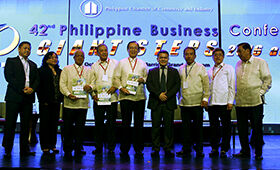Launching of the Cost-Benefit Study on Dual Training System in the Philippines
The first Cost-Benefit Study on Dual Training System in the Philippines, supported by BIBB has been launched. The study reveals that costs and benefits for firms, per trainee per month, differ in regard to firm size, sector, region and duration of training. Furthermore the average gross costs for firms are lower and the short-term benefits are higher if trainees are retained by the firm after finishing their training.
The K to 12 Plus Project and the Philippine Chamber of Commerce and Industry Human Resources Development Foundation (PCCI HRDF) with the support of the Technical Education and Skills Development Authority (TESDA) and the Federal Institute for Vocational Education and Training (BIBB) launched the Cost-Benefit Study (CBS) on Dual Training System (DTS) in the Philippines on October 13 at the 42nd Philippine Business Conference.
The launching of the study was attended by Philippine Chamber of Commerce and Industry (PCCI) President Mr. George Barcelon, PCCI HRDF President Dr. Alberto Fenix Jr., and Philippine Business Conference (PBC) Chairman Mr. Angelito Colona. Also present was PCCI TVET Committee Chairman Mr. Antonio Sayo. University of the Philippines School of Statistics Dean Dr. Dennis Mapa personally handed the study to PCCI.
A short video presentation was played to brief the audience on the plenary about the DTS and the findings. The Cost-Benefit Study of DTS in the Philippines would not be possible without the efforts and support of TESDA, BIBB, and other German Partners.
The study reveals that in average, the gross costs per trainee per month, in the four regions where the CBS has been conducted amounted to 12,800 PHP (US$ 272). The average short-term benefits per trainee per month through productive contributions amounted to 5,487 PHP (US$ 117) which covers 43% of the gross costs. The study shows that firms engaged in DTS are confronted with average net costs amounting to 7,313 PHP (US$ 154) per trainee per month. The net costs can be reduced by retaining the trainees over a certain time, saving induction and recruitment costs. The study performed furthermore simulation exercises to calculate both the short-term and long-term benefits of the DTS programme under the assumption that a trainee stays in the firm for three months for different firm sizes, industry types and training durations. Through these exercises and the combination of short-term and long-term benefits it became clear, that in several firms, sectors and regions the net costs outweigh the gross costs in average by 3,500 PHP (US$ 75).


